
Described as China’s history book, Xi’an is considered the birthplace of the ancient Chinese civilization. Located in the central-northwest of China, Xi’an is famed for its Terracotta Warriors of the Qin Dynasty and a plethora of museums that are acclaimed worldwide. While the city’s 3000-year-old history attracts hundreds of thousands of tourists each year, its recent history as a thriving local economy is now attracting almost as many business travelers. The crowds waiting in the bus and train terminals may not be as big as those in cities like Beijing or Shanghai, but it’s still recommended that you plan your Xi’an airport transfer ahead of time. In order to avoid any hassles or delays. Here are your 3 best options:
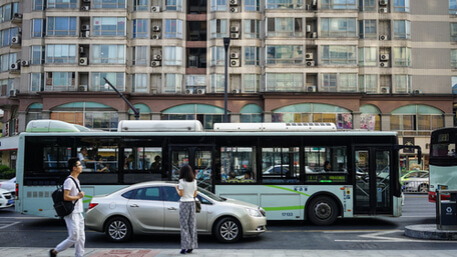
Taking an airport shuttle bus is a popular option for local travelers. If your hotel sits near a bus station, or the airport itself, taking a bus makes sense. Partly because buses can be a convenient and easy-to-use option for most first-time travelers. As well as, due to the fact tickets are so freely available at the Xi’an Xianyang International Airport. Terminals two and three of the Xianyang Airport have large ticketing booths exclusively for the airport shuttle buses. If you’ve been to Xi’an before, and still have a Xi’an Public Transport Card, you’ll also able to use it to pay for your ticket. Simply scan the card before getting on board the bus. Be sure to check that you have funds on the card before hand, though.
It’s worth noting that the bus drivers are unlikely to speak any English. Meaning, you should research and note your route, and what stops you’ll be using, before finding your seat. All of the bus stops in Xi’an are signposted in both English and Mandarin. They’re easy to miss or confuse if you aren’t paying attention, however. Researching what times the buses operate is also worth checking before your flight lands in Xi’an. The buses aren’t available 24 hours a day, if your flight lands at and odd time, you should prepare alternative travel arrangements.
Preparing for a trip to China? A private transfer is the safest, quickest way to travel from the airport to the city. China Car Service is a trusted transportation service helping business travelers for almost two decades. We provide door-to-door service at competitive prices.Make your journey stress-free and contact our 24/7 team at Bookings@ChinaCarService.com with questions, or get a quote below. Use this promo code: 10CARBLOG to get a $10 discount on your 1st service. |
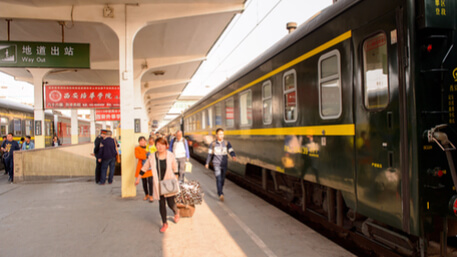
While Xi’an might not offer the high-speed bullet trains you can find in cities like Shanghai; its metro system is a popular transport method. Its stops conveniently reach some of the biggest and most historic tourist attractions. Attractions like the old China Museum, the Big Wild Goose, and even the Huashan Mountain. For this reason, many tourists choose to find their way using the metro.
The metro network offers both English and Mandarin signage to guide you along your way. Nonetheless, the routes can be confusing, even for local travelers fluent in Mandarin. If you’re not accustomed to the buzz and chaos of a public metro at peak hours, you may find yourself lost and confused rather quickly. If you’re visiting Xi’an on business, the subway route probably shouldn’t be your first choice for an airport transfer. Xi’an does have two central lines which cover a vast amount of the city but unless your hotel or office is near one of the metro stations, you’ll likely be in for a long walk to your destination.
A useful tip to consider before using the metro systems is to use luggage that is easy to carry on and off any of the trains. The Xi’an metro can be fairly busy, especially during peak hours. Perhaps another reason why using the metro isn’t ideal for business travelers stepping off the plane.
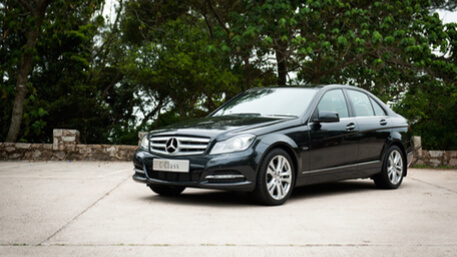
Getting a taxi anywhere in China isn’t as simple as most travelers would expect. First-time travelers, especially, believe that hailing a taxi in China is straightforward and safe. Just as with many other countries in the world. In truth, it’s slightly more complicated than that. It’s not uncommon for passengers to wait as long as 45 minutes to catch a ride from the airport. Taxi drivers are also known to adopt a dismissive attitude towards foreign travelers. This is because they’re unlikely to bother with someone they can’t easily communicate with. In China’s major cities, Xi’an included, there’s always some taxi drivers that look to take advantage of foreign travelers. Either by over charging them for the ride or even scamming them out of their luggage. If you’re intent on using a taxi when landing in Xi’an do some research beforehand to ensure you avoid any scams.
Business travelers visiting Xi’an and other Chinese cities often decide that using a car service is the easier, safer, and more reliable option. If your company is traveling in a large group to visit your manufacturer or business partner in China, car services are the way to go. With drivers who speak English, adhere to pre-arranged times, and offer a comfortable ride to your destination. Using a car service removes all of the hassle and headaches you’d rather be without when traveling to China on business.
Xi’an is a beautiful city that embodies much of China’s ancient appeal. Regardless of whether you’re visiting on business or not, it’s hard not to sponge up some of the historical culture throughout Xi’an. While China’s eternal city may not be as large or as crowded as cities like Beijing or Shenzhen, there’s a thriving business and tourism scene that attracts millions of visitors each year. If you’re lucky enough to be one of them, arranging your Xi’an airport transfer is easy when planning ahead of time.
If you’re looking for an airport transfer service in other cities like Beijing, check out this article on best ways to get from Beijing International airport to downtown. Safe travels!
Xi’an offers a world of opportunity to business travelers and holidaymakers alike. If you’re planning a trip to China’s eternal city soon, take advantage of our online discount and book your Xi’an airport transfer now!


Traveling to any foreign country can be daunting at first. Few travel places seem to be as overwhelming and exciting as China. The world’s most populous nation has much to offer, thriving economic sectors and growing tourist attractions draw millions of visitors each year. A fair share of those visitors opting to use a taxi while getting around, fall victim to the most common taxi scams in China. While the majority of taxi drivers in China won’t try to scam you in any way, there will always be a few unscrupulous characters looking to make an easy buck off unsuspecting foreigners. Learning about the scams ahead of time can help you prevent getting tricked to pay more than the actual fare during your visit in China.
Unlicensed and unofficial taxi drivers are common in most countries, and China is no different. Unlicensed taxis are referred to as ‘Black Taxis’ necessarily because of their color but rather the fact that they’re unregulated drivers. While the introduction of popular riding apps such as Didi has helped reduce the amount of unregulated drivers, there is still a fair number of them in operation around airports and tourist hot spots in China’s biggest cities looking to take advantage of visitors. Their vehicles may look the same as any other taxi but their tactics to overcharge foreigners can be confusing to those not aware of them.
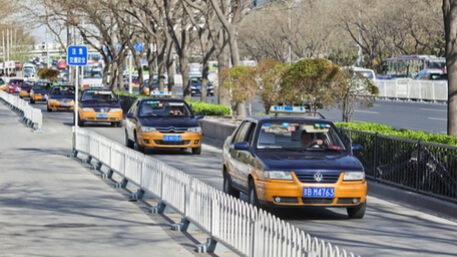 Installing fake meters: The fake meters can work in different ways. Some drivers will cover their meters with a ‘preset’ charge from the beginning, meaning your ride begins at 40 RMB as opposed to 0 or 10 RMB. Another tactic commonly used practice in black taxis is to rig the meter to rack up charges at an irregular speed, some tourists have experienced meters that charge as much as ten times the regular rate per kilometer.
Installing fake meters: The fake meters can work in different ways. Some drivers will cover their meters with a ‘preset’ charge from the beginning, meaning your ride begins at 40 RMB as opposed to 0 or 10 RMB. Another tactic commonly used practice in black taxis is to rig the meter to rack up charges at an irregular speed, some tourists have experienced meters that charge as much as ten times the regular rate per kilometer.
Driving off with your luggage: Another common trick that’s used by taxi scammers in China is to ask the passenger to get out of the car and help push it after faking a breakdown or to ask the passenger to help close the trunk, claiming it wasn’t closed properly in the first place. Once you’ve stepped out the vehicle, the driver will speed off with your luggage in the trunk and sell your goods on the black market. In extreme cases, drivers have also been known to drop foreigners off in unknown locations before collecting their money and then driving off with their belongings, leaving the passengers stranded in an area they are not familiar with. If you’ve forgotten your luggage in a licensed taxi, you’ll be able to call the taxi company and arrange to meet the driver to reclaim it. In unlicensed taxis, the driver will likely be off before you even get the chance to take down his license plate number. If your baggage fits, keep it with you in the back seat to remove any risk of the driver riding off with your items as soon as you step out of the car.
Using counterfeit notes: Counterfeit bills are popular in many countries throughout Asia. When getting changed by the driver, make sure he hasn’t swapped out your original bill for a counterfeit note. Many such cases have been documented in Beijing in particular. The drivers have perfected this skill to the point it is extremely difficult to notice the bills being swapped. A great way to detect this happening is if your driver returns the bill claiming it to be fake and then asks to get another one.
Each taxi should have the drivers information in front of the passenger’s seat, on the right side. Make sure to snap a photo of that information as soon as you get in the car, and remember to take the receipt after the ride has concluded.
A private transfer is the safest, quickest way to get around China. China Car Service is a trusted transportation service helping business travelers to China for almost two decades. We provide door-to-door service at competitive prices.Make your journey stress-free and contact our 24/7 team at Bookings@ChinaCarService.com with questions, or get a quote below. Use this promo code: 10CARBLOG to get a $10 discount on your 1st service. |

The easiest way to prevent this type of fraud is by pre-arranging a licensed taxi or a car service to get you from the airport or the hotel to your next destination. An important thing to remember when using taxis in China is that all licensed taxi operators have license plates beginning with a specific character, all licensed Beijing taxis for example have “京 B” prefixed on their plates. Official taxis also use a red light of some description on top, or inside their vehicles, usually connected to an official meter. Whilst illegal ‘black taxis’ either have no light at all, or hang a red light inside their vehicle, independent of the meter. By doing so they tend to mimic the official drivers to confuse unknowing tourists.
If you do decide to use a taxi in China, but haven’t had the chance to arrange your travel ahead of time, make sure you join the official taxi queues at every airport which are marked in English. When a person approaches you asking if you need a ride chances are he is an owner of an unlicensed car and is looking to find an unknowing visitor to scam and charge a lot more than the regular licensed drivers.
Another point to consider, in order to avoid not getting scammed, is doing some fare research ahead of time. Standard taxi rates in China are freely available online, so you’ll be well aware when someone is trying to overcharge you.
If you realise that you are being scammed, politely ask the driver to stop immediately. Before getting out, take a picture of their registration (which is usually clearly visible inside the cab), so you’re able to report them to authorities as soon as you get the chance.
It’s well known to anyone who has used taxis in China that drivers can be rude and dismissive to foreigners. Not being able to communicate with passengers is seen as a problem for taxi drivers in any of China’s bigger cities, so much so that many of them refuse to pick up foreigners. The easiest way to avoid any of the hassles it to make use of a reliable car service that can communicate in English and guarantees your safety when getting around China.
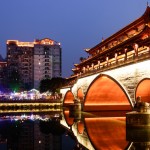
Chengdu is a popular destination year-round, thanks to it being China’s Panda capital, as well as a growing manufacturing presence. Luckily for those visiting the pandas, Chengdu serves as the transport hub for the entire region. Most travelers passing through China’s Southwest pass through the city, often staying over to explore its culture. If you’re making the trip soon, here are your options for getting from Chengdu airport to the city:
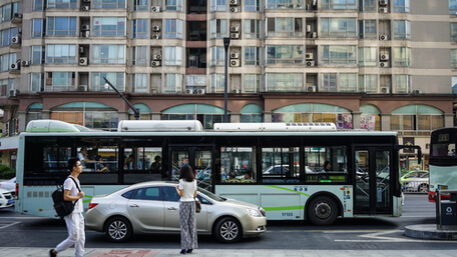
The bus is the most popular way to get into the CBD. It’s generally the easiest and most cost effective when traveling between the airport and the city center. Finding the bus heading towards the center of town is fairly easy. Signposts are in Mandarin and English, and fairly easy to locate when you’re exiting the arrival terminals. The designated booths sell tickets into the city for 10 RMB (1.50 USD) per person. Buses leave approximately every 15 minutes on one of five bus lines available to passengers. Depending on traffic (peak hour traffic is chaos in any of China’s major cities), the journey should take about forty-five minutes.
Before choosing the bus, remember that any of China’s major cities are subject to large crowds in most public transports. Not all of Chengdu’s buses are air conditioned, and will naturally be crowded during peak traffic hours. Nonetheless, if budget is a concern, using the bus is always a decent option.
Preparing for a trip to China? A private transfer is the safest, quickest way to travel from the airport to the city. China Car Service is a trusted transportation service helping business travelers for almost two decades. We provide door-to-door service at competitive prices.Make your journey stress-free and contact our 24/7 team at Bookings@ChinaCarService.com with questions, or get a quote below. Use this promo code: 10CARBLOG to get a $10 discount on your 1st service. |
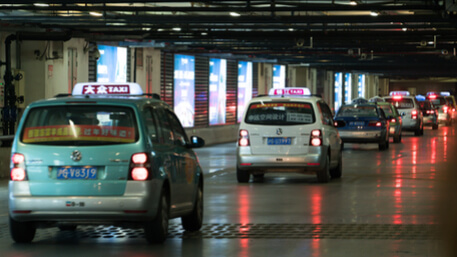
All of China’s major cities offer plenty of taxis at any of their airports. Taxis in China, however, are not as simple to use as they may be elsewhere in the world. China’s taxis have earned an unfavorable reputation for several reasons. Many travelers have shared stories of being scammed, overcharged, and had their luggage stolen by deceitful taxi drivers. Though these are probably a minority, many do purposefully ignore foreign travelers, wanting to avoid the hassle of communicating with a non-native speaker.
If you decide to take a taxi upon your arrival, we strongly suggest that you prepare beforehand. Have your destination address written down clearly, in Mandarin, on a piece of paper you can hand to the driver. Most hotel and airport staff are happy to write down the information for you, if you haven’t already done so yourself.
As with the buses, you’ll often have to deal with queues before finding your taxi. The Chengdu airport has a waiting line outside its main arrival terminal for passengers to queue while waiting for an available taxi. The queues can take a while, making this option less ideal if you have an important meeting in the city waiting for you.

If you’re traveling on business, the overall easiest option is by far to use a car service. The hassle free experience, comfort, and all around convenience make it the best option. With a car service, you can avoid language barriers, unnecessary delays, and other stresses during your trip. Reliable car services will offer English speaking drivers who can accommodate to your schedule and get you where you need to be, on time. These services also provide a door-to-door experience. Meaning, they’ll pick you up at the airport and promptly deliver you to the door of your hotel or meeting in the utmost comfort.
There are a number of ways to get into the Chengdu CBD that can suit each individual traveler. There’s no doubt, public transport in China’s major cities has improved dramatically over the past decade. However, the crowds and chaotic roads are still the norm, rather than the exception. It should come as no surprise, seeing as how China is the world’s most populous nation.
Like the nation it’s in, Chengdu has plenty to offer for new visitors. Aside from the natural draw of tourists hoping to catch a glimpse of China’s beloved Pandas, Chengdu is Western China’s economic hub. Whether you’re making the journey to explore the city’s growing economy, or it’s adorable panda attractions, doing your research before you travel can save you valuable time and hassle.
If you’re looking for an airport transfer service in other cities like Beijing, check out this link on the best ways to get from Beijing International airport to downtown.

Hong Kong is one of the world’s most unique and prosperous cities. Millions of holidaymakers and business travelers make their way to the former British colony each year. With so many people visiting, and so many others already living there, it’s easy to understand why Hong Kong is one of the most crowded cities on Earth. If you’ve never been and were hoping to rent a car or catch a taxi, you’ll be amazed at the chaos that awaits on Hong Kong’s roads. The density of cars in the city are amongst the highest in the world. The water-locked geography of the city means that expanding road networks to accommodate the heavy traffic is almost impossible. Therefore, traffic jams have almost become as symbolic to Hong Kong as the beautiful ocean and mountains that surround it. With so many locals and visitors trying to make their way across the city each day, public transport can also become a challenge. Navigating the roads on your own is certainly not a good idea, and taxis have a reputation for being unreliable and quickly problematic. If you’re thinking of using a Hong Kong car service to make your way around town, here are the pros and cons to consider before doing so:
Relying on China’s public transport systems during peak hours can be nerve wrecking for first-time visitors. Hong Kong is no different. Road networks, in general, are chaotic and potentially a dangerous place to be for those not experienced. Conventional taxis also have a reputation for being poorly maintained. Hong Kong, being the tourist hub that it is, luckily has some of the better-serviced taxis available. Alternatively, if choosing a car service, provided you’ve chosen a reliable company, you’ll be comforted by the fact that all their vehicles and drivers will be of the highest standard. Never compromising on your safety or comfort.

Communicating in any foreign country can be tough if you’re not familiar with local languages. Even in Hong Kong, a former British colony, it’s rare to find a taxi driver that speaks fluent English. They’ll most likely speak Cantonese or Mandarin. This can become problematic if your directions and schedules haven’t been communicated to the driver ahead of time. Luckily, most professional car services offer English-speaking drivers. Getting valuable information lost in translation is not a struggle you’re likely to enjoy if you’re at risk of missing your next flight or meeting!
Any experienced traveler will know that travel doesn’t always go according to plan. For one reason or another, flights can be missed or delayed, meetings can run late, or plans can change. Your transport should be able to accommodate whatever changes you may need to make. An excellent car service will offer a degree of flexibility and understanding, ensuring you’re not left stranded at the last minute. Having a car service to get you around Hong Kong means your travel arrangements are scheduled around you, not the other way around.
Preparing for a trip to Hong Kong? A private transfer is the safest, quickest way to travel from the airport to the city. China Car Service is a trusted transportation service helping business travelers for almost two decades. We provide door-to-door service at competitive prices.Make your journey stress-free and contact our 24/7 team at Bookings@ChinaCarService.com with questions, or get a quote below. Use this promo code: 10CARBLOG to get a $10 discount on your 1st service. |
Hiring a car service tailored to your schedule will be more expensive than public transport. Depending on the company, rates may comparable to or slightly higher than taking a taxi. However, the comfort of having a private car with an experienced local driver take you from the airport to the door of your hotel or office is an expense many travelers are happy to make. Holidaymakers traveling on a budget may not require the services provided by a private car service. Nevertheless, family groups and business travelers often prefer the comfort provided by the service. For those travelers looking for a more economic solution, airport transfers via bus or train in Hong Kong will be a more suitable solution. These options, though cost-effective, do incur certain discomforts like crowded spaces, long travel times, and the added difficulty of having to make your way through a new city.
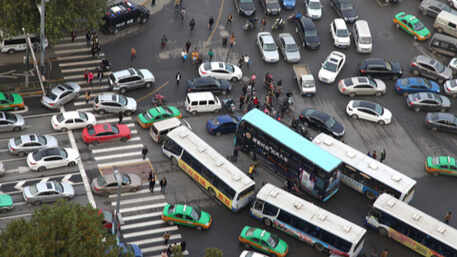
Though you may be traveling in a far more comfortable car, no car service can skip the traffic at peak hours. The driver’s intimate knowledge of Hong Kong’s road networks may save you a couple of minutes here and there, if they plan your trip efficiently. However, the chances of you finding yourself sitting in a traffic jam remain high. If you’re able to get some work done while being driven between destinations, perhaps the traffic won’t seem as daunting. If not, the prospect of using a train or arranging for a trip outside of peak hours will make the most sense.
Navigating Hong Kong’s roads can be troublesome, especially if it’s your first time visiting. Before deciding on which public transportation option is best for you, be sure to do some research on each. For many travelers, the comfort and convenience of a car service is a preferred choice. Particularly when every minute counts, especially for those having flown halfway across the world. Safety should be the priority of every driver and not something you should have to worry about. Being afforded the flexibility to suit your travel needs with the comfort of being able to communicate with your driver often means that hiring your own private car service is the safest, most convenient, and most comfortable way to go.
If you’re looking for car rental with a driver in Mainland China, here are some things you can expect from car service in China and tips to utilize it to your best comfort.
If you find this blog useful, please feel free to share it!
Have you used a car service in Hong Kong recently? Any comments or advice you’d like to share? Feel free to comment below!

China’s thriving economy draws millions of business travelers to its shores each year. The bright lights and bustling of any of China’s major cities can be overwhelming to those visiting for the first time. A little research can prevent a lot of stress if you know what to expect with the chaotic roads, crowded stations, airport delays. All these things can be distracting. Your focus should be on the trade fairs, business meetings and negotiations you’re holding on your visit. If you’re traveling soon, this is how to prepare for your next event in China.

It goes without saying that you’ll need a valid visa to enter China, regardless of what event you’re attending. However, some countries are eligible for visas on arrival (see below). If you’re not sure about visas on arrival, or just want to have your visa before arriving, you can apply from your home country at any Chinese embassy or consulate An official event invitation, or an invitation from a local company, usually aids the process of obtaining a business visa.
Not every airport or access point in China can issue visas on arrival. If you’re planning on having your visa issued once you land in China, you’ll only be able to do so from the following points of entry:
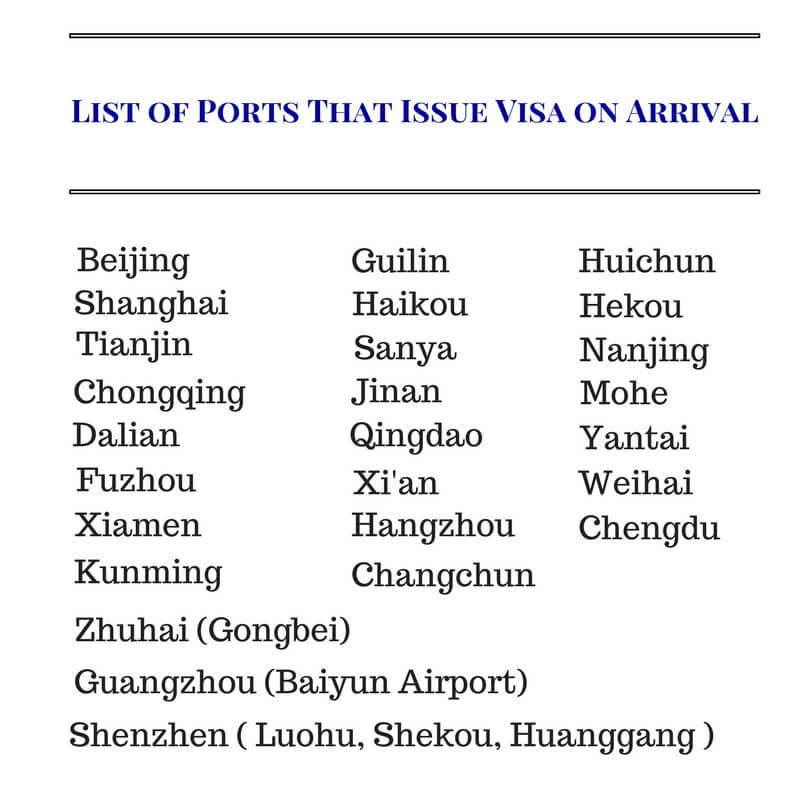
Obtaining a visa in some countries can be a painful exercise, with tedious paperwork, fees, and interviews needing to be completed before a decision is made. Luckily China’s Visa application process is clear. You’ll need the following when applying:

Events in China attract people from all over the world for business and tourism alike. This means that booking your accommodation ahead of time is essential. Booking several months in advance can save you a lot of time and expenses. The rates will be much higher if you try to book last minute, they’ll go up regardless of where you stay. It’s better to find accommodation closer to the event so you can cut down on your travel time and focus on your business interests.
We recommend you look through apps like Agoda, Bookings.com, and Ctrip (Trip.com) before making a decision. Browse through the reviews to familiarize yourself with the accommodation.
A useful tip in choosing a hotel is to go for a well-known, reputable brand of hotel. A well-known brand will always maintain a standard of service and amenities, ensuring you have a comfortable and hassle-free trip. Other local hotels may not be quite what you hope for when booking. Make sure the location is central, preferably surrounded by restaurants and cafes, so you won’t have to travel far to find a nice meal while you’re there.
Cash is a concern when traveling to most places around the world. Few business travelers enjoy carrying copious amounts of foreign currency on them physically, and not every credit card, or mobile payment app, is accepted worldwide. Luckily China has some easy payment or currency exchange options. The main payment body in China is Union Pay. So, if you’re traveling with a Visa or Mastercard it can get very tricky at times to make payments, especially in smaller establishments where cash or mobile payments are preferred.
We recommend you have some currency exchanged before leaving for China. ATMs in China have a low limit for withdrawal, among other issues. HSBC, Bank of China, Agriculture Bank of China, Industrial and Commercial Bank of China, and China Merchants Bank are some of the banks that allow you to withdraw money from their ATM’s. However, most of the hotels and restaurants in the larger cities will accept major credit cards.
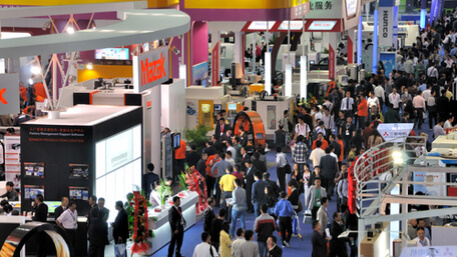
If you’re attending a trade event looking to meet with brands or companies able to supply materials for your next product, prepare beforehand. Research the specific companies that interest you before meeting them. Knowing the market prices of products you’re planning to purchase, for example, will prove essential. Understanding the wholesale and retail prices of products you’re interested in will help you avoid wasting time with companies who aren’t able to match your expectations.
Contact suppliers beforehand, as well. Finding and prospecting a new supplier takes a lot of work. Asking for catalogs and pricing beforehand can speed up the process and allow you to dig deeper into more specific questions at the trade show since you already have a basic understanding of the details.
It’s important to make sure that you have a well-planned itinerary along with pre-arranged meetings with your Chinese suppliers. This will not only ensure that your work gets done on time, but will help in determining the various logistics that are required to make your business trip to China successful. It’s important to be in contact with the companies before making your journey and informing them in advance about your visit. This will ensure that you don’t waste time. Double check the pre-arranged meeting when arriving in China, as plans tend to change.
A business trip to China can be very overwhelming. Fortunately, if you take note of these points before your departure, you’ll be well prepared for your next event in China. Get your visa issued first, then go ahead with your bookings. Ensure that you arrange for accommodation and transport. Flying into a big city can be tiresome on its own, so arrange for a pick-up service that provides you flexibility and comfort while you’re in this incredible country. With a well-prepared itinerary and the right services, you can look forward to a very productive trip to China.
Events in China have become essential to businesses around the globe. The country’s powerful economy is too lucrative not to be a part of. Thankfully, traveling in and around China doesn’t have to be as difficult as it once was. Preparing ahead of time can save you the hassle and headaches you’ll so desperately wish to avoid on your next travels.
Have you been to an event in China recently? What advice could you share with anyone looking to do the same soon? Leave your comments and feedback below!
If you find this blog useful, please feel free to share it!

Domestic air travel in China has improved dramatically over the last decade. As the world’s fourth largest country, spanning over 9 million square kilometers, traveling mainland China used to be challenging to those with business interests in opposite ends of the country. While high-speed trains are a viable option, the high-speed network doesn’t connect all of China’s major cities just yet. Regular train networks or long-distance buses are hardly a viable travel option for business travelers, considering the inevitably long journey times when crossing such a large country. Thankfully, Chinese airlines are rapidly becoming world class airlines. If you need to travel from Beijing to Hong Kong, for example, a train ride will take you an entire 24 hours. Hopping on a plane would be your best option, considering the same journey will take less than 4 hours via air. With so many options to choose from, here are our top choices for Chinese airlines to use.
Air China is one of the largest carriers operating around the world. An average of 85 million passengers aboard the 324 aircrafts Air China has in its fleet each year. One of whom happens to be the Chinese president, Xi Jinping. While most international presidents have dedicated aircrafts, Xi Jinping proudly prefers to be seen flying on the national carrier, as opposed to having an aircraft all to himself.
Air China’s business class offering is everything you would expect from an airline of its size. Their business cabins are considered one of the largest of any airline, affording passengers those few extra inches of space and comfort that frequent travelers appreciate.
Air China is also a star alliance member, with code sharing agreements with some of the biggest international airlines, and their routes cover more airspace than any other Chinese airline. Despite the airline being a popular choice amongst passengers, it’s still highly likely that you’ll be stuck in terminals dealing with flight delays that are all too common in China’s airports. Luckily, Air China has dedicated airport lounges at most of China’s major airports. Fortunately, the lounges are well equipped. Most of them offer free Wi-Fi and snacks for you to catch up on work or fill up on something other than airline food. Operating between all of China’s major cities and flying daily to every corner of the earth.
Are you flying to China soon? Take advantage of our online discount and secure 10% off your next car service!
China Southern Airlines is another force to be reckoned with. Considered the biggest airline in Asia, both in passenger size and fleet. There are an incredible 489 aircrafts flying to 193 destinations across China and the world. Globally, the airline is the fourth largest passenger carrier. It’s also sixth, worldwide, for domestic kilometers traveled each year. Over 100 million passengers climb on board a China Southern flight either internationally or domestically every year. There isn’t a major city in China that you can’t reach with China Southern.
The airline is renowned, amongst Asian business circles, for having one of the best business class cabins on the market. The seats recline to a fully flat position, as you would expect on most major airlines. They offer more width than most of their counterparts, which allows business travelers that extra bit of comfort while traveling. Some may be slightly surprised when taking their seats to find that there is no TV or media screen dedicated to their seats in business class. No need to worry, the cabin staff hand out 9-inch tablets, similar to an iPad, where you’ll find a fair range of movies and entertainment to pass the time. Some of the newer aircrafts even include imitation-wood paneling in the business class cabins. For those traveling often, this small attention to details adds to the comfort and overall flight experience.
While some of China Southern’s competitors struggle to implement effective customer service strategies, the reviews of CS’s cabin staff and crew are positive and highly regarded.
Hainan Airlines takes the last spot on our list for its quick rise among the world’s elite airlines. One of only eight carriers throughout Asia to have been awarded a five-star rating from UK-based consultancy firm, Skytrax. The airline is the largest privately owned airline in Asia, based out of Haikou in Hainan. Its destinations include over 500 cities across China, most of Asia, and the wider world. If you’re looking for a Chinese airline that will prioritize customer service and innovation, Hainan’s cabin crew and staff are also acclaimed among the top ten most helpful, polite, and well-trained staff in the world.
Hainan has established itself as a quality pioneer within the Chinese market. Its fame as the ‘largest privately owned airline in China’ has certainly earned it a loyal business customer base. Arguably, the Chinese public believe that state-owned enterprises in China have less incentive to do the ‘best job possible.’ As a result, they’re perceived to offer less impressive customer services. It’s believed that privately owned enterprises are forced to be innovative and outperform one another to stay competitive. Whether or not this common belief is true, Hainan Airlines has certainly benefited from that perception.
Business travelers regularly navigating China are likely to appreciate the privacy their business class cabins provide. The seats and entertainment system are on par with any of their competitors. Still, it’s their loyalty program that truly endears most of Hainan’s passengers. Being the first Chinese airline to partner with the world’s largest loyalty program, Points.com, passengers who fly with them regularly convert their loyalty points into value-added services. Aside from the usual airline perks, such as ticket discounts, they can exchange their points for gifts, physio or spa treatments, and even discounts on sporting events.
Domestic travel in China has consistently managed to go above and beyond in quality expectations over the last few years. Millions of travelers, whether vacationing or visiting on business, arrive in China each year. As a result, China’s airlines have improved their standards to align with global demands. While still subject to delays and overcrowded airports, flying through China is no longer as difficult as it once was.
For further reading, here are some tips that travelers can and should adopt to make their trip easier. China can be a confusing place for even the most experienced traveler. The stress can pile on if you don’t have a trusted airport transfer arranged for when your plane finally touches down. Make sure everything is arranged before you land, to make your visit as smooth as possible.
Have you flown with a Chinese airline recently? Which ones would you recommend? Share your tips and comments below!
If you find this blog useful, please feel free to share it!

China has certainly become a popular destination worldwide in the recent years. The country has attracted an astonishing 141 million visitors in 2018 alone. The consistent growth of China’s business and tourism attractions is largely due to the importance China sees in customer service and in providing services in English language. In most of the business districts and tourist hubs, across the cities, there are now services designed to help visitors and locals with their shopping, traveling or doing business. If you’re visiting China soon, this article points out how to prepare for your stay.
If you hold either a U.S. or EU passport, you will not need a visa to enter Hong Kong. US citizens can enjoy their visa-free stay in Hong Kong for up to 30 days, and EU citizens for up to 180 days. However, you will need to obtain a visa if you are travelling to mainland China. For only one entry to China, you can apply for a one-entry visa, while for more than one entry, apply for a multiple-entry visa.
Visa requirements to enter China vary greatly from country to country. For example, British passport holders can only obtain a multiple entry visa after obtaining at least two 30-day single-entry business visas previously. American passport holders, on the other hand, can obtain a 10-year multiple-entry business visa without holding any previous visas.
For most recent information check the Chinese visa requirements.
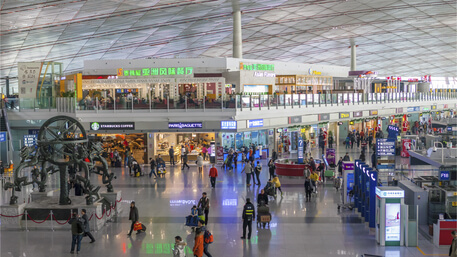
Unless you’re arriving by cruise ships at one of China’s coastal cities, chances are the airport will be your first experience of Chinese soil. Those who often travel enough may feel that every airport is the same. China, however, may be a little different. Despite the upturn in customer service, China’s airports and domestic carriers are still plagued by flight delays. It’s not uncommon to experience 2 or 3-hour delays for short domestic flights. As a result, you might find yourself getting comfortable in one of the airport lounges. Luckily China has some of the best airport lounges in the world. Most of the lounges will offer the usual Wi-Fi, food, and comfort. But some even offer dedicated office space, equipped with secretarial services and just about any equipment you can imagine.
If it’s your first time in China, you’ll be happy to know that signboards and announcements are done in both English and Mandarin. The boards themselves may seem overwhelming at first glance, but when in doubt there are always a number of help desks or airline representatives who are there to help with anything from general flight information, to writing your hotel or office address down in Chinese to show to your taxi driver (always a good idea). Most will have some knowledge of the English language, and if not, there are many translation apps that can be very helpful when trying to communicate your destination with the taxi driver.
As with most big airports across the world, China’s also offers some “retail therapy”, with numerous duty-free outlets to choose from.
Preparing for a trip to China? A private transfer is the safest, quickest way to travel from airport to the city. China Car Service is a trusted transportation service helping business travelers for almost two decades. We provide door-to-door service at competitive prices.Make your journey stress-free and contact our 24/7 team at Bookings@ChinaCarService.com with questions, or get a quote below. Use this promo code: 10CARBLOG to get a $10 discount on your 1st service. |
By Plane:
If you’re planning to travel around China with domestic flights, it’s highly likely to experience delays on your trip. According to the latest figures, less than a fourth of all domestic flights in China depart on time. Hangzhou airport is considered to be the least punctual, since only 42% of its flights depart on time, which is the second-worst figure globally. Frequent travelers to China usually prepare an extra set of clothing in their carry-on luggage, in case they are caught by delays that leave them in a hotel for an extra night. To avoid other unexpected surprises on your luggage restrictions and airline food, read useful tips for air travel in China.
Renting A Car:
The first thing you’ll want to do after a long flight is likely to head towards your hotel to freshen up and get some rest. Hiring a car in China to get there is hardly an option for foreign visitors. China’s roads are very different from those back home and as such tough to master for those not accustomed to Chinese driving rules. Signposts in Mandarin are also making it very difficult to navigate the streets unless you can read the Chinese characters. Furthermore, you’ll need to obtain a Chinese driving license, since international permits aren’t valid in China.
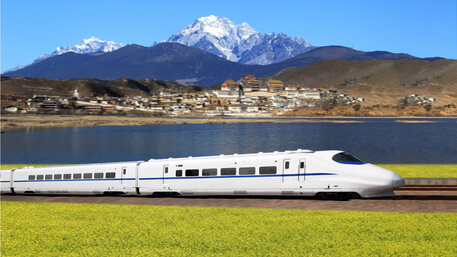 Using The Trains:
Using The Trains:
China truly has an impressive and modern high-speed rail network with remarkable high-speed trains making the train travels as fast and comfortable as ever. Just as with any transport option in China, there are a few things to keep in mind before buying a train ticket. The terminals themselves are huge and often confusing. If you’re hopping on board a train during peak hour, brace yourself for overwhelming crowds. A nation as populous as China is bound to endure some transport headaches, especially during the daily peak hours.
Buses: The buses are frequent and connect almost region of China. While a bus ride is the most affordable method of transport it can, often be the longest and potentially a very uncomfortable transportation option. Bus tickets being competitively priced might make it difficult to find an available seat to reserve at any time during the day.
Taxis: Before you decide to hail a taxi in China there are a few things to know. Some drivers may not offer a ride for the foreigners just for the sake of avoiding the hassle of having to speak in a foreign language. Taxis in Shanghai are consistently rated least satisfactory, and one of the reasons is taxi drivers who blatantly refuse to accept the ride because they find the desired location distance too short for them to drive. In case you didn’t already know, refusing of fares is illegal throughout China. Beware of drivers trying to rip you off, by charging extremely high fares.
Using A Car Service: The private car offers by far the highest level of convenience and comfort. No waiting, no queuing, and no changing modes of transit. It assures that you complete the journey quickly without expended effort. The private car service is highly recommended for time-sensitive business travelers, travelers with a lot of luggage, families traveling with children, and seniors.
To book a car all you visit a car service website and select your pick-up location, desired time of pick-up, and the destination.
Chinese culture is vastly different to what western visitors are accustomed to, but not impossible to become comfortable within. The language is an obvious barrier, but one that can easily be overcome by a bit of research. There are multiple ways to make your trip to China stress-free. Good starting point is learning a few basic phrases that will help you communicate with the locals.
Here is the list of helpful phrases you should know when going to China:
This is just a simple way of saying thank you.
Hello in Chinese combines the words ‘you’ and ‘good’. To ask someone ‘How are you?’,
just add the character ‘吗‘ (ma). This character is used when asking a question:
If they cannot speak English, they will probably respond with:
I can’t speak (bú huì) 不会.
This sentence comes in very handy in situations where you may not understand what the person is telling you.
Bargaining is very common in China, so this question is a great starting point when beginning a conversation with the seller.
Translated this phrase means “‘no need for thanks’, this is a common response to 谢谢 (xiè xie) – thanks.
In addition to learning some basic Mandarin, there are some useful apps that help translate signs or phrases into Cantonese or Mandarin. One of the ways to better navigate around China is to hire an English-speaking driver, translator or an assistant from a reputable service provider that will make your trip hassle-free.
The basic phrases in Mandarin can also help make a good impression on your Chinese partners too. However, if you travel to China for business purposes, you will find it useful to know more about Chinese business culture. For instance, Chinese people may ask such questions as “Where have you been?” and “Have you eaten?” which is similar to Westerner’s ‘How are you?’. As a response you can offer a smile and follow with ‘yes’ or ‘thank you’. The Chinese don’t tend to say ‘no’ as it causes embarrassment and “loss of face”. They would rather say ‘Yes, but it may be difficult’, in case they don’t agree on some conditions. Although that may seem like a positive response, it most probably means no. The Chinese also nod as an acknowledgement that you are being heard, rather than symbolizing ‘yes’ so it’s important to take note of that. If you plan to successfully conduct business in China, you are encouraged to develop insights into the Chinese business culture and social etiquette to avoid misunderstandings and form good business relationships.

A convenient, comfortable hotel room is essential during travels to any country in the world. Most Chinese cities offer a vast number of hotels to choose from, and most of them offer plenty of commodities to enjoy after a long day of work and meetings.
China’s internet restrictions have Facebook, Twitter, Gmail and most of popular Western apps completely blocked throughout the country. Luckily certain hotels are accustomed to housing business travelers from abroad, and to bypass those restrictions by offering a VPN within their hotel lobbies and occasionally even the rooms themselves. If your company has booked you a four or five-star hotel, apart from the usual luxuries, the biggest comfort will be the staff who can speak fluent English. If you’re in China for an event, like the Canton Fair held every year in Guangzhou, the hotel staff are often able to help you arrange tickets, transport or even facilitate secretarial services while you are away from the office.
Every Chinese city offers a wide variety of restaurants to eat in when the business day is over. If you’re planning on wining and dining with potential or existing Chinese business partners, the options are many. Hong Kong for instance, is famed for having some of the best entertainment spots in China. The views of a naturally scenic city, from the top of any one of the iconic skyscrapers on offer, is truly breathtaking. They are bound to leave an impression on you and your guests. For those concerned about adapting to a Chinese diet while visiting, it may be surprising to know just how much western influence there is in China’s cuisine scene. Many major cities have Italian, French, Mexican, Indian, etc. cuisine to choose from. There are also the biggest global fast-food outlets present in almost every corner of Chinese cities which are great for a quick and on-the-go meal.
China has 1000’s of trade fair each year across every industry imaginable which bring millions of visitors. The Canton Fair, which takes place twice a year attracts over 190 000 visitors. Trade shows are a great way to meet new suppliers and catch up with existing supplier all in one place. Meeting face to face and grabbing a meal or a drink together goes a long way. These meetings in person help strengthen business relationships and ensure a better understanding of future steps and goals on both sides. You can find a comprehensive list of exhibitions on China Exhibitions website which can help decide which fairs to attend. Make sure that you have a well-planned itinerary along with pre-arranged meetings with your Chinese suppliers. A little research on Chinese nuances and traffic conditions will help avoid delays and better prepare for your next event in China.
Traveling to China for business is quite different from traveling to China for a vacation trip. Days are normally scheduled for business meetings, factory visits, and you’re more likely to be constantly moving from one city to another. This leaves a small room for souvenir shopping. However, your family and friends would be delighted to receive a gift from your business trip to China. Instead of trying to find presents the last couple of hours before your flight and ending up buying them at the airport, we’ve picked up great gift ideas for you. The typical teas and qipaos can be considered for purchase if you have more time to go to the market or tea house. However, for those short on time, we have prepared a list of 7 unique and easy-to-find gifts from China.

Chaotic road networks, pollution, unfamiliar food and culture, poor customer service, and all-around bustling cities can daunt even the most experienced travelers. The world’s second largest economy attracts millions of tourists and business travelers each year. All of whom, are likely aiming for a hassle-free trip that allows them to focus on their business ventures in the East or absorb the many sights and wonders that China has to offer. Here are our three best stress-free China travel tips:

One of the most challenging obstacles for foreign business travelers in China is the language barrier. Some of the largest tourist areas, particularly in major cities like Beijing or Shanghai, will have staff able to communicate in English. You may even be lucky enough to find a taxi driver that understands where you need to go in English. The reality is, however, that most taxi drivers won’t be able to speak any English whatsoever. Often, they won’t even stop for foreign passengers because they don’t want to deal with the frustration of not being able to communicate. For most taxi drivers, they prefer to stick to passengers that speak Mandarin, or whichever the local dialect may be.
Business in China also has its own set of language barriers. If you’re an importer manufacturing your products in China, there’s a good chance the factory handling your goods speak very little English, if any at all! This can lead to confusion regarding product specifications, a hassle that every company would rather avoid. To overcome the risk of any vital details being lost in translation, a lot of importers hire bilingual production management teams or professional translators to communicate with when language risks derailing their business.
Even those doing business in the corporate arena may find communication obstacles at first. It’s a good idea to learn a few basic phrases and keywords. You’ll find these to be very helpful when getting around China, or even when greeting your business interests in China. Luckily, there are apps for almost everything nowadays, Pleco, for example, is a great translation app that will help you communicate. It’s free to download, but the premium subscription ($14.95) is so advanced it’ll recognize and translate Chinese signposts and documents you point your phone camera towards.
Preparing for a trip to China? A private transfer is the safest, quickest way to travel from the airport to the city. China Car Service is a trusted transportation service helping business travelers for almost two decades. We provide door-to-door service at competitive prices.Make your journey stress-free and contact our 24/7 team at Bookings@ChinaCarService.com with questions, or get a quote below. Use this promo code: 10CARBLOG to get a $10 discount on your 1st service. |
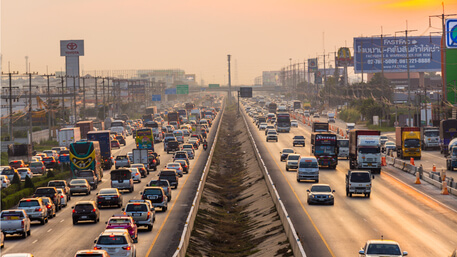
For anyone who has visited any of China’s major cities, it’s common knowledge that driving yourself around is not a good idea. If you have an International Driver’s Permit (IDP), you should know that it isn’t valid in China. If you decide to go through the steps to obtain a Chinese driver’s license, you’ll need a visa which is valid for more than 90 days. Although it’s fairly inexpensive, it can be very time consuming and generally troublesome. Not something most travelers will want to deal with while on a business trip (unless, of course, you fancy taking a computerized 100-question multiple-choice test on Chinese traffic laws).
As the world’s most populous nation, China has a very well-structured public transport service. High-speed trains, public buses, taxis, and bicycles are all used regularly by locals and experienced visitors in most of China’s major cities. The public transport networks are affordable and connect the entire country.
Be warned, however, that these public lines are often as crowded as the motorways during peak hours, due to the sheer number of people. Getting in and out of the city center can be challenging if you’re pushed for time, or not familiar with the surroundings. Most train and bus stations will have signposts in both English and Chinese, but with the size of the crowds filling most terminals, it’s all too easy to get confused.
Whether it’s your first venture into China, or you’re a regular visitor, convenience and peace of mind while traveling will be high on everyone’s wish-list. If you’re traveling for business, the time spent concentrating on the purpose of your trip is the priority. So, selecting a professional car service is probably the most convenient way to get around, as it offers the flexibility you require when traveling. For instance, if flight plans change, your car service can accommodate to your needs and re-arrange your trip accordingly. Meaning you’re never distracted from important business with unnecessary worries about travel arrangements.

For those who’re new to China’s quirks, you may be surprised to know just how extensive China’s internet censorship is. With over sixty internet censorship regulations in place, you won’t be able to browse your Facebook feed or even access your Gmail account without the use of a VPN. That doesn’t mean that every popular app is restricted in China, though. There are still some popular and very useful apps you can take advantage of:
WeChat: An amazing 90% of working professionals in China use WeChat, daily. Aside from the usual social networking, emails and even payments can manage through the app. In addition, business has quickly adopted using the instant messaging giant as standard practice. To the point that it’s now common to use the app’s QR-code feature to scan your counterparts’ QR-codes and add them as a contact. This is currently even more common than swapping business cards! Its speed and stability (in China) also mean that WeChat can be used for file transfers and even conference calls. For business in China, creating your own account is a must.
OffMap: Google Maps won’t work thanks to China’s ‘Great Firewall.’ OffMap is an extremely useful alternative when navigating the country. You can download the map of a specific region, or the whole country, beforehand for only $US 0.99. Even when you don’t have access to the internet, OffMap gathers information using the GPS locator on your phone to provide you with real-time location. It also includes recommendations for restaurants; in case you aren’t familiar with your surrounding areas.
Virtual Private Network (VPN): Fear not! If you can’t live without your Facebook feed, Instagram updates, or more likely your Gmail account, you’ll need to install a VPN on your phone or device to bypass China’s internet restrictions. It’s important to note that, even with a VPN, the Internet speed in China will be far worse than what you’re used to. Android phones are also particularly affected in China as most of their main functions are Google-driven. iPhones, luckily, aren’t as affected.
China has, without a doubt, established itself as a global superpower. The amount of business taking place within China’s economy draws millions of visitors every year. The stresses associated with travel in China are well documented but, lucky for you, also easily avoided. Utilizing these China travel tips can ensure you’re able to focus solely on the reason you’re visiting the East, as opposed to worrying about small issues along the way.

Shenzhen has quickly become one of China’s leading destinations for business travelers. With its proximity to Hong Kong and Guangzhou, and its quick rise to fame as one of the world’s leading technology hubs (“China’s Silicon Valley”), its increasing rate of visitors should come as no surprise. Navigating the city on your own, though, can be quite challenging. This is why most visitors prefer hiring a car with a driver in Shenzhen.
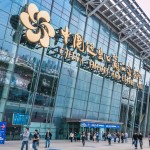
Each spring, Guangzhou plays host to the world’s largest trade fair. With over 50 product categories, and thousands of visitors every year, the Canton Fair is a must for those with business interests in China. Hosted twice a year, in April and again in October, the event lays claim to the largest assortment of products and attendance of any such event worldwide. On average, 20 000 vendors and over 100 000 buyers attend the fair twice a year. The scale of the Canton Fair can be daunting for those who are first-time visitors. Our Canton Fair tips for business travelers will help those attending focus on the business opportunities that await.
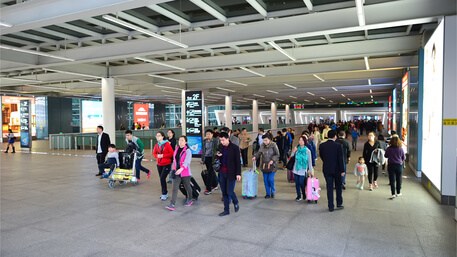
It should go without saying that a valid passport and visa to enter China are a prerequisite to visiting the fair. You’ll also need to have your passport ready at the fair to register for entry. Though you shouldn’t have a problem attending the fair on a tourist visa, most travelers prefer to obtain a proper business visa, just to be safe. Applications for the Chinese visa can be made at any Chinese embassy or consulate in your home country, or neighboring country if there isn’t a consulate or embassy near you. Some countries are eligible for visa-on-arrival, you can check online to see if you’re from one of these countries. Regardless, we would highly recommend preparing this before your arrival in China, to avoid any delays during your trip. It’s also highly recommended that you register for the Canton Fair ahead of time to receive an official invitation letter that will aid in your visa application process. You will need to prepare a handful of supporting documents to substantiate your visa application, such as a copy of your business registration certificate of foreign company’s representative office in China, a valid employee certificate, and a copy of your ID card.
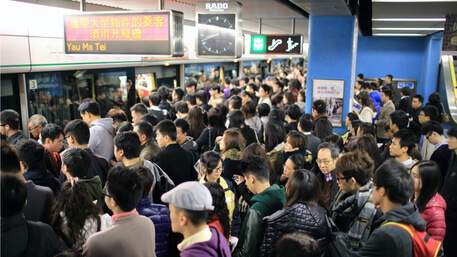
Not all airlines fly directly into Guangzhou, the host city for the Canton Fair. Most carriers offer flights directly into Hong Kong, however, the closest major business and travel hub. You have a variety of options to get from Hong Kong to the fair. The quickest choice would be to make use of the Intercity train that runs between Hong Kong’s Hung Hom Station and Guangzhou East Station. There are 12 pairs of trains that run daily between the cities, with the journey lasting just 2 hours each way. Luckily, the route has both English and Mandarin signposts, so navigating your way through the stations shouldn’t be too confusing.
If you decide against taking the train, you might choose the more cost-effective option of long-distance bus travel. Buses run regularly between the cities throughout the day, although navigating the bus stations can be tricky if you’re not fluent in Mandarin. This route is not as recommended, however, as the road networks leading to Guangzhou can get very crowded at times, and this could add more than just a few hours to your journey time.
Alternatively, you could decide to take a taxi or make use of a door-to-door reliable car service. Taxis have a reputation in China for being a hassle, often not wishing to pick up foreigners who they assume won’t understand them. If you do choose to make use of a taxi, ensure you have enough cash on you. Drivers don’t accept credit cards. If reliability and convenience are what’s most important to you, taking the 3.5 ride with a car service might be your best option.
A private transfer is the safest, quickest way to get from Hong Kong to Guangzhou. China Car Service is a trusted transportation service helping business travelers to China for almost two decades. We provide door-to-door service at competitive prices.Make your journey stress-free and contact our 24/7 team at Bookings@ChinaCarService.com with questions, or get a quote below. Use this promo code: 10CARBLOG to get a $10 discount on your 1st service. |
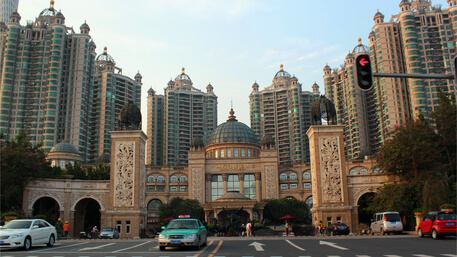
The Canton Fair attracts well over 100 000 people each time. This means that booking your accommodation ahead of time is crucial. Booking several months in advance could save you quite a bit of time and money. The rates notoriously go up during the fair, regardless of where you stay. One of the useful Canton Fair Tips for business travelers is to try and find accommodation as close as possible to the fair itself. Whether walking, using a taxi, or a car service to the fair each day, cutting down your transport time each morning and evening will give you more time to focus on the business interests you’ve traveled halfway across the world to see.
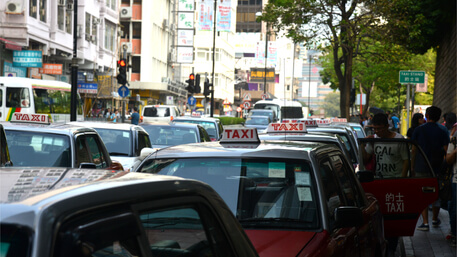
If you’ve prepared responsibly and booked ahead of time, you’ll hopefully find a hotel that’s within walking distance from the fair. Considering how much of the day you’re likely to spend on your feet, canvassing the vast halls of the exhibitions, you might decide to take a break during lunch and rest for a while back at your hotel. Having a hotel near the fair can assure you don’t waste any time on the commute, and can feel refreshed as you continue meeting new business prospects.
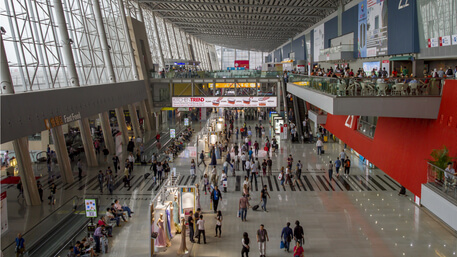
With the fair attracting visitors from every corner of the globe, it’s highly recommended that you pre-register via the official Canton Fair website. Once registered, you’ll be able to apply for an ‘overseas buyers badge’ using their BEST (Buyer E-service tool). The badge usually takes three working days to confirm, but it’s worth its weight in gold during the fair. The badge allows you to join “express” queues once inside the fair, reducing your waiting time when meeting with vendors and companies you’re interested in. Remember that entering the fair will require you present your passport, 2-4 passport sized photos, and pay the 200 RMB fee at the entrance.
A little planning goes a long way. Particularly at the Canton Fair. A view of the exhibition sitemap can be very helpful and efficient. Identifying ahead of time where the vendors you’re interested in are located, can save you hours of aimless wandering through the fair. The best advice is not to rush your time at the event. Taking halls row by row or following a pre-planned systematic approach works best for those who visit the event regularly. The fair itself recommends the official “Sourcing app” available from their website. Assisting you with the necessary contact details, floor layout and general helpful info regarding the fair.
If there’s a company that you’re excited about, there are booths on offer which can be booked ahead of time to offer you the privacy and security you need to discuss your business needs. Do your research before meeting the companies that interest you. Knowing the market prices of products you’re planning to purchase, for example, can prove to be and essential advantage in negotiations. Understanding the wholesale and retail prices of products you’re interested in will avoid you wasting time with companies who aren’t able to match your business needs.
Language shouldn’t prove to be a barrier at the fair either. Almost every sign is printed in both English and Mandarin. There are also guides and translators at the fair who you can hire on the day. Although, if you’re planning on hiring a translator/guide, it’s recommended you hire someone in advance. This way you can ensure you’re getting a qualified translator at a fair rate.

With 1,180,000 square meters of exhibition space at the event, it’s always wise to wear comfortable shoes, keep hydrated, and prepare a few snacks when visiting the fair. Any experienced visitors to the fair will tell you that preparing a small lunchbox or planning meals beforehand will save you time and hassle. If you forget to prepare water, snacks, or a lunchbox, there are food kiosks and small shops at the fair. The prices will be higher than outside the fair but it’ll save you the trouble of having to look for something elsewhere.
If you’re planning on making your way through most, or all, of the exhibitions, a wheeled trolley bag will come in handy. Many visitors choose to empty their carry-on luggage at the hotel and bring it to the fair to help in collecting product catalogs and brochures from the different vendors. A backpack is not recommended as it can become rather cumbersome to lug around. Business cards are also essential. Some vendors won’t even share their product catalogs or brochures if you don’t hand over a business card in return.
There are hundreds of exciting opportunities that await at each Canton Fair. Those who plan well in advance often find the most success at each event. Securing accommodation close to the exhibition will minimize your travel times each day that you might need at the fair. When getting between your hotel and the exhibition halls, if you’re aiming for a hassle-free trip, using a car service will ensure you’re able to focus on what’s most important during your visit to the Canton Fair.